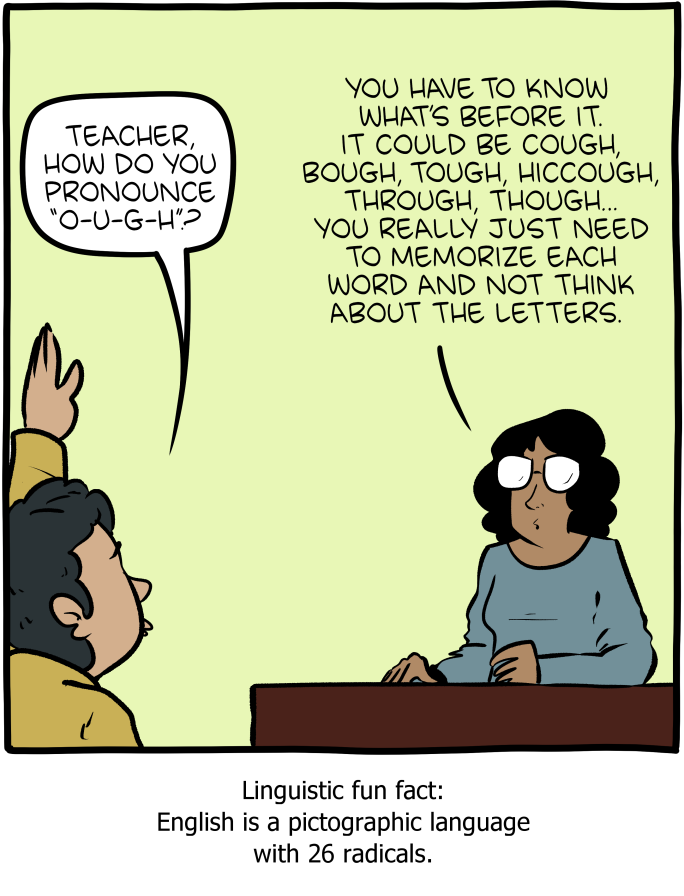this post was submitted on 20 Aug 2023
500 points (98.4% liked)
Linguistics Humor
1063 readers
79 users here now
Do you like languages and linguistics ? Here is for having fun about it
Share this community: [!linguistics_humor@sh.itjust.works](/c/linguistics_humor@sh.itjust.works)
Serious Linguistics community: !linguistics@mander.xyz
Rules:
- 1- Stay on Topic
Not about Linguistics, language, ways of communications - 2- No Racism/Violence
- 3- No Public Shaming
Shaming someone that could be identifiable/recognizable - 4- Avoid spam and duplicates
founded 1 year ago
MODERATORS
you are viewing a single comment's thread
view the rest of the comments
view the rest of the comments


Yes! I’ve made that comment a lot; French is easier to learn than English because you only need to learn how to pronounce syllables, while in English you have to learn every single word. It’s insane.
Lol. Spoken and written French are so different they’re basically two different languages…
As a two year Duolingo slave I can attest french is in fact 3 languages in a coat.
There's written french, official spoken french and then the soup everyone speaks because nobody cares about proper speech rules.
French is still pretty consistent once you know the syllables. If you give me a word I don't know, I'll still be able to pronounce it correctly. You can't expect that with English.
Les poules couvent souvent au couvent.
Ok, it's true that verbs have different pronunciation rules. If you know that it is the verb, it's not an issue. But I admit that it can be tricky for new learners.
Yeah, everything’s easy once you’ve learned the exceptions!
So, heteronyms do exist, and there’s several hundreds of them. Yes, less prevalent than English, still though.
Now let’s turn around: homophones.
How do you spell [so]?
L‘auteur a peur des [otœr]? Is the author afraid of heights or authors? 🤔
Il y a plein d‘[o] [o] [o]. Good luck writing that down.
And let’s not go down the route of ambiguous verbs, where different verbs end up with the exact same conjugation, shall we. Rayions? Peignant? Moules (also plural of moule, lol)?
Oh, what about those accents? Say what you want about German Umlauts, but at least they’re consistent. Why does accent grave not change the pronunciation of a and u, but e? How do you know where to put an accent circonflexe?
Homophones don't impact the pronunciation though, which was the main subject of the top comment (the second part anyway). And I definitely agree that French is not easy for foreigners, especially regarding spelling. But pronunciation rules are much more consistent than in English.
To summarize, my point is that going from the spelling to the pronunciation is (much) easier in French than in English. The other way around (pronunciation -> spelling) is of course much harder in French, as you said, and the French school system shows that: we just have to look at how important the exercise of "La Dictée" is.
Small note to be finicky: "L‘auteur a peur des [otœr]?" is not an issue, since for "auteurs", you pronounce the "liaison" with "des", whereas you don't with "hauteurs". But I still get your point ;)
Well, the joke is about the relation between spoken and written English, so „how do you write [o]“ is just the same joke but in reverse 🤷♀️
And none of that touches my original point, i.e. that written french is syntactically different from spoken French.
Look, I have several German-French friends with whom I took French class in high-school. They grew up with two languages, their spoken French is flawless, they couldn’t write a single paragraph if their lives depended on it.
Loic Suberville's YouTube shorts on French vs English (and sometimes Spanish) are pretty entertaining to show that they're all difficult as a non-primary language. :)
Man French was so difficult for my brain to parse. The word genders felt so silly/arbitrary that it never stuck, which is hilarious given the context of ... English, but omfg did it not gel with me.
Yeah the general lack of gendered nouns is one of English's better traits, even if most of our words are bastardized words from other languages.
It’s the same in German. The issue is that people learning the language try to make sense of it. It doesn’t feel arbitrary, it is completely arbitrary. As a native you don’t think about that at all, because they’re like one word to you.
When you learn a language like German as a native, you don’t have rules or think about what is gendered how and why.
It’s not that you learn „Sonne“ (sun) and „Mond“ (moon) first and then learn the appropriate gender for each.
You learn „die Sonne“ and „der Mond“ from the start. It’s just one word with a blank in the middle to us.
Yeah. It's funny because I am learning Danish eight now and it makes infinitely more sense than French ever did but I think it's because, at least to me, it's much closer to English and a lot of it is "well we do it just cause?" and my brain is like "oh cool great! I know how to cope with that".
Whereas learning something that is so structured like German/French it feels very overwhelming I guess in that sense. I don't feel like I have to think about Danish because it feels very 'normal'.
Huh, I mean, sure French is different from either English and Danish, since it’s a Romance language, but I’m not sure why you would add German to that, which is closely related to English and to Danish as well. Especially if you speak Lower German dialect you understand a lot of Danish, which has been influenced by Low German since medieval times.
Danish is actually more structured, you have less leeway regarding syntax.
A lot of my teachers (danish speakers) or miscellaneous people often comment that German is easier because of its structure or uh formulaic-ness, or that is what I tend to hear that mostly. It might just be that there are a lot of Germans or German speakers in my area.
Conversely when I was learning French it was never prescribed as difficult, just lots of memorization for the uh... forms/genders? it's been too long I barely remember any of it to be honest, but now I see all of the French loans in Danish ಠ_ಠ
But generally my issues or frustrations with Danish stem from when modern words are prescribed as 1:1 translations when older/uncommon English words more aptly describe what is being said. Which in fairness would probably not be words a non-native speaker would have knowledge of.
I think syntactically Danish is much less complex and easier, you know, only two cases, two genders. It’s just that nobody understands shit when they open up their mouths… ¯\(ツ)/¯
https://youtube.com/watch?v=s-mOy8VUEBk
Oh, and the way they count is… I mean, you couldn’t do it worse than the French if you tried, but the Danish are just „hold my gløgg… halvfjerds“ 🤡
I hate danish numbers because I flip letters/numbers a lot when I speak in English so Danish is just turbo fuck-you mode of numbers sucking ass.
And yea it does come out as ... noise vaguely masquerading as "important sounds". At least Norwegian was like "lol wtf are out doing get those shitty letters you don't even say out of here nerds". Swedish .... Swedish scares me. I hate when there is Swedish in Danish movies because I can't hear Swedish and read Danish without my brain melting.
Yeah, but I’m used to that, it’s the same in German (and it sucks, especially for people with dyslexia), no, what I meant is the way they actually count.
You know, like 99 in French is „quatre-vingt-dix-neuf“? „4 (times) 20 (plus) 10 (plus) 9“.
Which I always thought the most idiotic way ever to come up with counting? Until I learned about the Danish…
Ever wondered why 50 in Danish is „halvtreds“? Because „halv tredje“ means… „half-third“? Which is 2 1/2.
Are you sitting? „Halvtreds“ is short for „halvtredsindstyve“, which literally means „half third times twenty“.
2 1/2 * 20 = 50 🤡
Same with 70, 90…
Yeah the mathing bits I knew were from something older, the entire equation I don't remember offhand. French has been mostly repressed.
I'm more upset about time verbage being absolutely fucked and ... crap I think it's 30 minutes... into the hour instead of before? It's so confusing and I get it backwards constantly because who fucking counts time like that even.
Like half til 6 (or however you say it idk) is 5:30 and not ... 6:30 or some asinine BS. I will take strange ye olde numbers over that shit any day. I just default to 24 hour time because I absolutely cannot be assed and it's very dumb. I've explained it very poorly but hopefully it makes sense lol. And they use quarter/half past like please... please stop, just tell me weird numbers.
Hah! Yeah, I understand, but I’ve been hearing this in spoken English as well, „half seven“ instead of „half past six“, though in school I was taught only the latter existed.
It’s like this in German as well, and it’s also regionally different, but once you get it it’s actually nice:
In most parts of Germany (and where I grew up) and in Standard German you tell time (literally) as:
Six, quarter past six, half seven, quarter before seven, seven.
In the south of Germany it’s: six, quarter past six, half seven, three quarter seven, seven. This never made sense to me, until…
… I moved to East Germany, where it’s: six, quarter seven (!), half seven, three quarter seven, seven.
Imagine my face, I never even had heard of this before I moved there 😂
I immediately picked this up because it rolls off your tongue way easier in German than the standard way. And it’s mindblowingly logical. I love it:
You just need to imagine an hour as a cake: one quarter of seven, half of seven, three quarters of seven, seven. Genius.